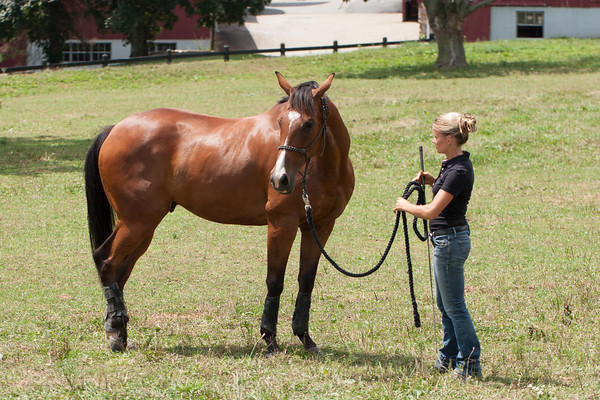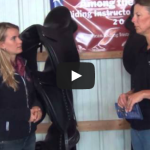We know that a person’s childhood and early development plays a large role in their beliefs and behavior as an adult.
Could the same be true for our horses? Does the length of time they spend with their dam, their interaction with other horses, and their early experiences shape the “horse they become?”
This is a question I’ve had for a long time, so I was excited to meet Juan Carlos Rey at the Equitation Science Conference in Rome last week and hear he is working to answer these questions.
You’ll hear my brief interview with Juan Carlos as well as with two other researchers from the conference in this week’s video.
In addition to learning about the role of early development in horses, you will also hear surprising research on horses’ use of shade during hot summers, and why we need to pay more attention to chronic pain in our horses.
Click play below to watch the video!
Learn more about the International Society of Equitation Science here: www.equitationscience.com













42 Responses
I was very interested in the findings about early development because my horse is a nurse mare foal who was orphaned deliberately at age 3 days. She never had another mare to nurse her, but fortunately she was rescued with a bunch of other foals. They were all bucket-fed, and she became very attached to the man who rescued them. She’s doing really well–we are training her in dressage–but she has “sharp elbows” where other horses are concerned. Very alpha, and I wonder if this is because she had to compete with larger foals (she was the smallest of the bunch) in the pecking order. It’s too early to tell about “performance” but she’s very level-headed and safe, easy to handle and train.
Hi Barbara, dealing with ‘bucket babies’ can be very, very difficult. I’m glad to hear her training is going well. I would guess that she didn’t learn correct social cues from her mother as foals raised with a mare will learn.
-Julia Burdy, CRK Training Community Manager
All interesting but the findings on performance horses who stayed with their dam longer was particularly interesting to me.
Hi Callie.thanks for the video. I have a comment regards each one of the topics.regards shade.I observed my two ponys this past sommer which wasis much hotter than usual and they both were mostly looking for a breeze.when there was no breeze they looked for shde and water.
Secondly early development.copping is one way for horses to learn and mentaly I am convinced that foals develop better and stronger if allowed adequate time with theyre mares.this also ties in with pain.horses that are relaxed and confident mentally matured are less prone to illness or injury .relaxation to me is a key in horse welfare.I have been taking care of a 15 year old pony.she had suffered laminities and her hoofs were in a bad way.she also suffered from metabolic syndrom.I adressed all of the issues with propper hoofcare and diet togetharwith massage.she has recovered completely.environment is another factor that is of utmost importance.I truly believe in a holistic approach.science is good to mark things but it must like everything be partnered with the knowledge of experience.
Glad to hear you were able to recognize and figure out her health problems! I bet she is a much happier pony now
-Julia Burdy, CRK Training Community Manager
I found the warning age to be intresting. I’ve always felt a fole that was with its mother longer is a benefit to the out come of a better adult horse.
On the topic of pain management & recognition of pain to be extreamly intresting !!! What signals are we missing that our horse may be in chronic pain !?
I think everyone should be educated in that !
I agree Kathy! Everyone should develop an eye for that!
-Julia Burdy, CRK Training Community Manager
Hi Callie,
Thanks for sharing your knowledge from the people you interviewed in Italy. In the first video, I am wondering if it depends on what climate the horses live to whether they seek shade or not. I remember when I lived in Brazil for a while, I used to see the horses, and often cows, gather under large trees, particularly during the hottest time of the day.
On the second video, I find it follows logic that the longer the foal gets to spend with his mum and pasture mates, the better and more confident he will develop. I am glad this was brought to light once again. Unfortunately, there is a great deal of greed, particularly here in the US, to keep breeding a mare and weaning the foal as early as possible to turn over for profit. Very sad
On the third video, I am so happy that more work is being done to identify chronic pain. Since horses do not speak our language, it is often difficult to identify whether difficult behavioural issues are related to pain or other issues.
Saying all that.the study on early developement I find the most fascinating one.imagine how it would change the lifes of Equines if we could change the way we look at Horses by acknowledging theyre needs regards mental and physical early developement.further more I believe this study has great appeal as lets face it in the end it pays off for the human too.could be a win,win situation.
Amazing, research especially on chronic pain in horses. I’m just a regular person who has had and loved horses almost all my life. But I have noticed personality changes in horses who were diagnosed with a painful condition or injury and think we as owners should be more alert to these issues or changes to help our equine family.
I’m hopeful for more information on this!!
Changes in the Spinal nerve is most concerning!!!
Horses defiantly have behavioral changes when they are experiencing pain which is why it is so important to check that off before pursuing training!
-Julia Burdy, CRK Training Community Manager
The shade research was actually my favorite! Thank you for sharing!
very interesting findings with the performance horses being with mothers longer. I would like to see the whole study as there would be several differences in the small holdings to the large stables. for instance how much interaction with the same human or for that matter just general human contact and there would not be room to put all weaned foals in the same paddock like on a big farm they would be more likely to be put with other adult horses to be weaned..
I agree Sue – I would love to hear more on that topic! I think that is definitely a hotly debated topic in the horse community!
-Julia Burdy, CRK Training Community Manager
I found all these video clips very fascinating and interesting to watch especially the one on chronic pain and early development. I have also observed not just my horse but also dog avoiding the shade during extreme heat and I also agree in that it is important not to assume that their needs are identical to human needs or preferences. Very interesting and thought provoking stuff, thank you so much for sharing. Angelika
Fascinating information. Thanks for sharing, Callie! If you have or receive expanded information about these studies, I’d love to read more. I think all are equally compelling, but the issue of chronic pain rises to the top, followed by the study on foal behavior development.
You made a brief passing reference to blanketing in connection with equine temperature comfort. Can you point me/us to a broader discussion of this subject? Thanks.
Hi Dick! We actually did a video on this! Click here to watch When to Blanket Your Horse.
-Julia Burdy, CRK Training Community Manager
The chronic pain research was definitely interesting. I know I suffer and am convinced a couple horses at a stable I work at do as well.
That is great that you are able to recognize the signs of pain, are the managers of the stable able to do anything to find the source of the possible discomfort?
-Julia Burdy, CRK Training Community Manager
I really enjoy and appreciate these interesting interviews! We live in Georgia where it gets very hot and humid, and it has always baffled me why our horses don’t get under a shady tree in the afternoons! They stay out in the pasture as though the heat isn’t a problem. I would guess that a foal that stays longer with its mother would be better adjusted and comfortable with the mothers modeling and teaching. The issue of recognizing pain in our horses would be of great concern to me; horses are too good at hiding and tolerating pain!! Thank you Callie for sharing great information from the conference!! I always look forward to hearing more!!
Hi Callie! Corrie here from Arizona! While I found all three topics informative , the fact that ASU found horses don’t utilize much shade in the heat was confirmation for me that my mare Zara wasn’t alone in her onstinance to seek out shelter from the oppressive Arizona summer sun! And from my back door all the way to Rome! Caio
I liked them all but I really liked the interview about the small studs that the foals stay with their mum longer. That is so interesting! I would love to hear more about that.
How long do you advice keeping a foal with its mother?
Most farms wean anywhere from 4-6 months old however this particular researcher is trying to move Swedish farms to move towards 8 months as a minimum, you may have seen a comment from another member of our community who said that in wild horses they found that foals aren’t weaned until almost a year!
-Julia Burdy, CRK Training Community Manager
I liked the one about the foals. When I bred my mare I looked into what evidence there was ( not much then) but what I did find is that in the wild foals nurse and are not weaned for an entire year. This study confirms, as usual, mother nature knows best. I do this with my foals, and I am definitely a small farm of 5 (soon to be 6 ) horses
Mother Nature knows best, love that – it is so true sometimes we think we can outsmart her!
-Julia Burdy, CRK Training Community Manager
I am a small breeder and I found the information on foals interesting. I usually allow the mommy to start to wean the foal and then I assist in a low key finish around seven to ten months. But this year my foal is so late and so large. He will be two months tomorrow and he is drinking milk from his his mom to the point where she is losing weight. He is eating hay, grass, and grain and she has begun to threaten him if he approaches her grain. She is eating at least two bales of hay daily, as well as grass and hay during several hours of daily turn out. I don’t want to negatively affect the foal by weaning too early but I don’t want the mare to get run down either, going into winter.
Marijan, that is a tough balance…are you able to separate them only for feeding time? Does the mare have access to hay at all times or lush pasture? What type of grain are you feeding her? Have you perhaps tried added some alfalfa to their diets? You may already know most of this but my professor from Penn State, Dr. Staniar, gives his thoughts on Feeding the Pregnant Mare in this article: https://www.bloodhorse.com/tradezone/PDF/tz_11-15-08.pdf
I hope this helps! Breeding was my focus in college so I have a soft spot for reproductive questions
-Julia Burdy, CRK Training Community Manager
Thanks Julia, good article. I, too, love the babies, and when you raise and train them from birth they are so much easier to have around when they grow up. She is getting two grain meals daily, with soaked alfalfa pellets, oats, Buckeye Cadence Ultra, corn oil and whole flax. She gets hay and grass too. Right after she foaled it was too much alfalfa and I had to back off, because her legs swelled up. But now the alfalfa ration is back up and she handles it just fine. She is an old, clunky style Hanoverian – the kind that looks like a large bus. She is 18 and this is her first foal. It took 5 years! So I may add a small grain meal at lunch. I have some Purina Amplify that I am using on a skinny pony, and I may add that too. And she gets my home made recipe of loose salt and minerals, free choice.
Thank you for sharing the excellent information from the conference! I am thrilled to be on your email list!
I was most interested in the nature vs nurture info, because I strongly believe in the longest period possible for mare and foal to bond, then wean on their time frame. I believe it greatly impacts horses positively!
We are thrilled to have you as a part of our community!
-Julia Burdy, CRK Training Community Manager
All of these interviews are so interesting! How do I found if there is any research going on where I live (Southern California)? I’d love to get involved.
Hi Maria, I would check out the International Society of Equitation Science’s website and possibly reach out to them to see if there is anyone in your area doing this research. I’m not sure if you are close to UC Davis but I know they had a college of agriculture – might be worth reaching out to them!
-Julia Burdy, CRK Training Community Manager
Thank you!
Thank you Callie for sharing and learning more and more ways to help riders. I am a beginner and trying to soak up everything I can to improve and be the best to my horse as possible. All of the interviews were interesting-surprising fact about shade especially in the AZ heat! I assumed smaller breeders may see better performance. What I didn’t quite grasp was the grimace scale bc it wasn’t explained completely and I’d very much like to be aware if a horse was in pain but not able to determine to what degree and sometimes not even what area . Thank you
I like the all three. I was very interested in the goal staying long with the mare.
I am very interested in the information given on pain and would like to learn more. Thanks for the video.
Hi Marilyn, yes – that topic is a hot one I believe in the industry and one that we should all be following!
-Julia Burdy, CRK Training Community Manager
Great series of videos!! I’ve been watching them all. I’m particularly interested in the one on how long a foal gets to stay with it’s mother. My horse, River, (buckskin gelding Quarter/Connemara cross) is SO MOUTHY – he constantly licks me for comfort when he’s stressed. As a mom who has breastfed all my biological kids, I know that this sort of behavior in humans can indicate that an infant has not had enough oral stimulation. I’m convinced he was taken away from his mother too early. To me, this is cruel, especially because the foals themselves cry when removed from their mothers. It is SO OBVIOUS!! I hope that trying this to performance in horses will motivate breeders to change the practice of removing foals from their mothers so soon. Thank you, Callie.
The issue of leaving foals longer with the mare is what interested me the most in the video as well. My daughter is trying to sell a mare with her 1year and 3 month old filly. If she can’t find a buyer who will take both, is the filly too young for the separation..
?
I was interested in the pain that many horses experience since I have an Appaloosa mare that has Laminitis. I was interested in learning more about behavorial indicators helping to know when our horses are in pain and where they hurt before it turns into a serious condition.